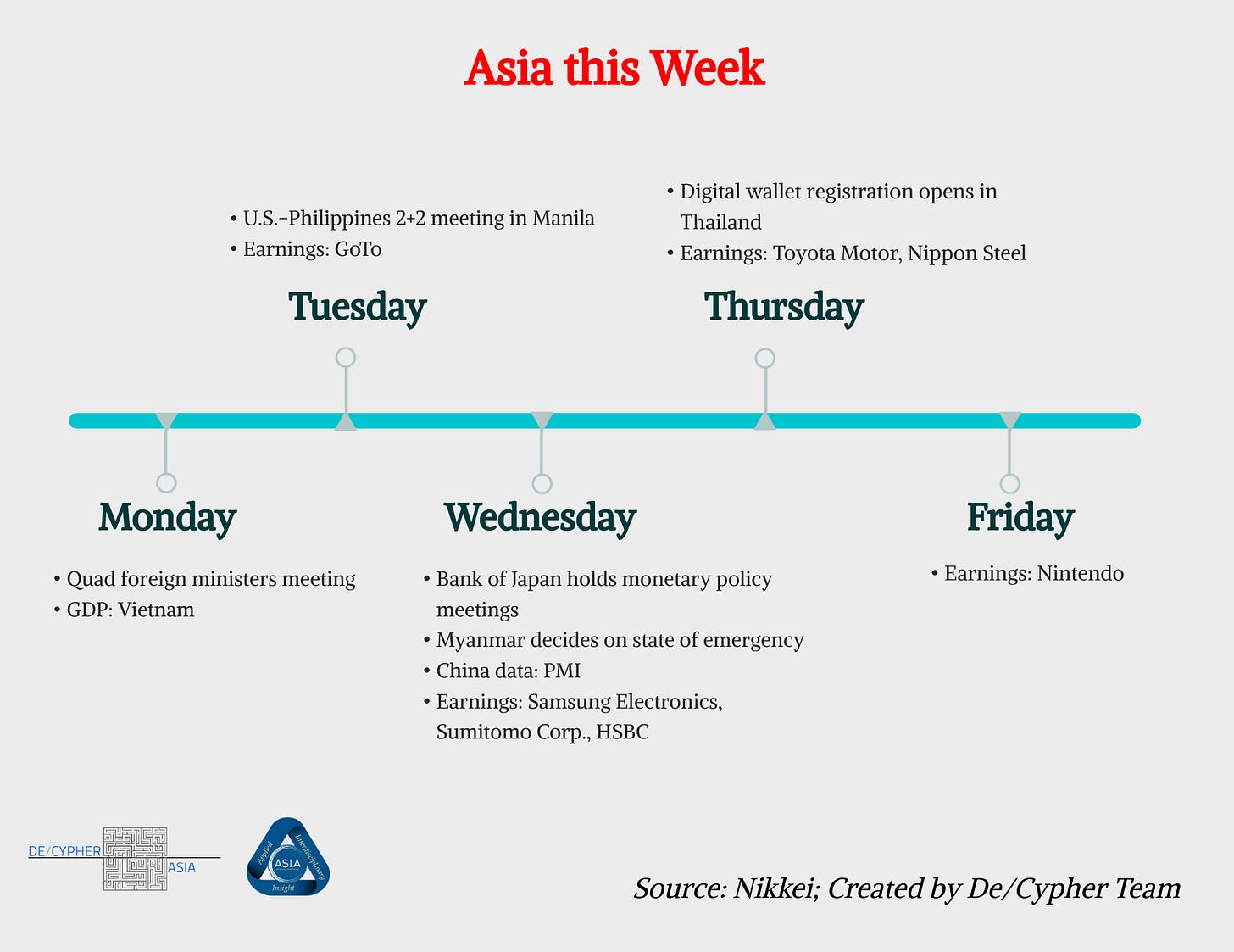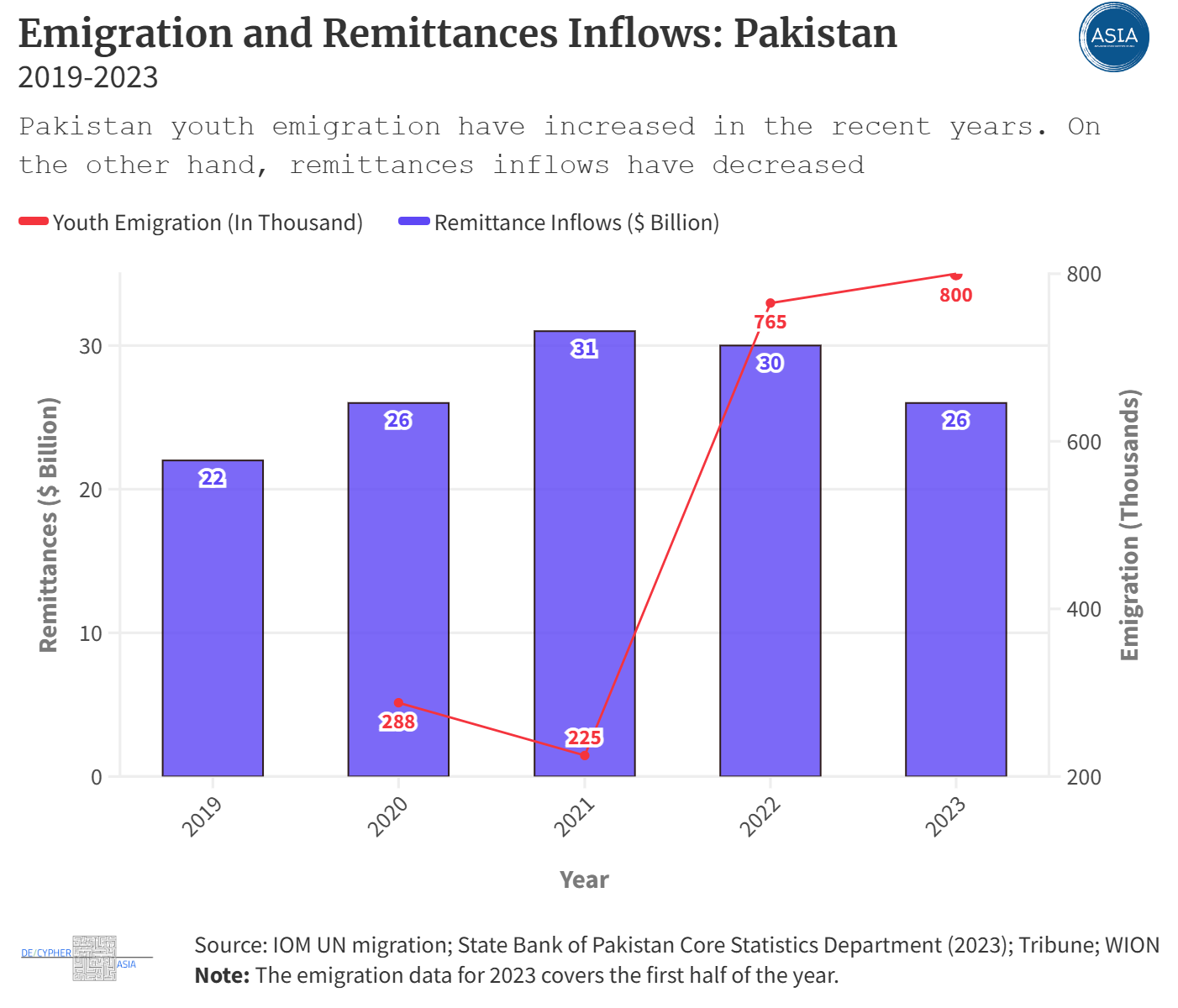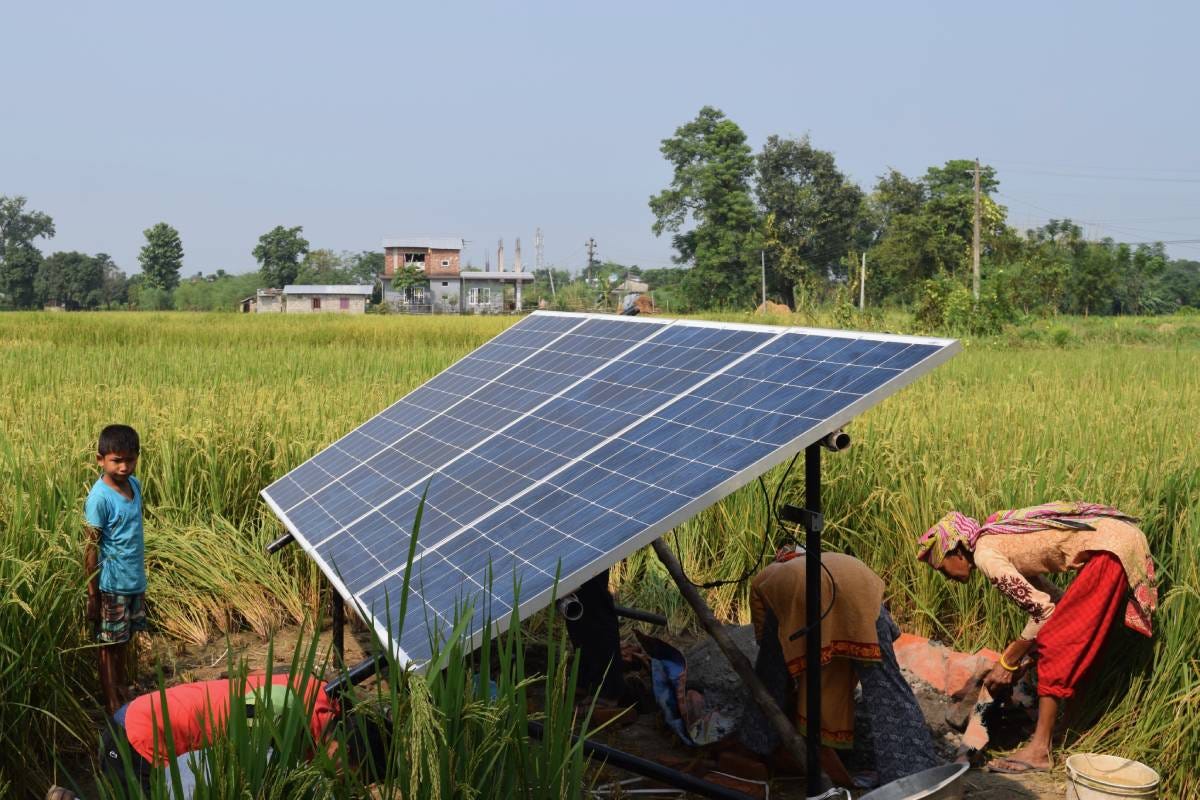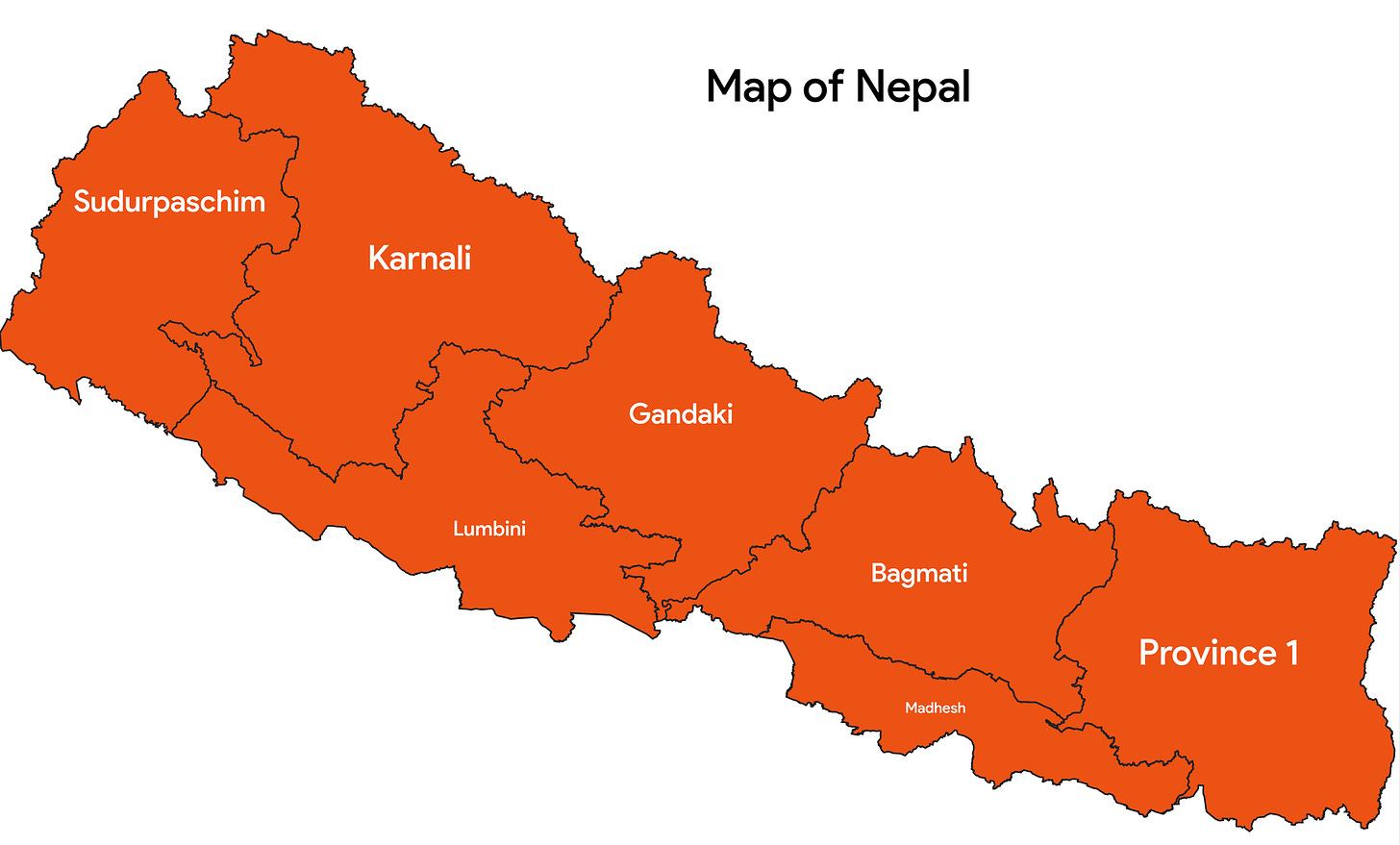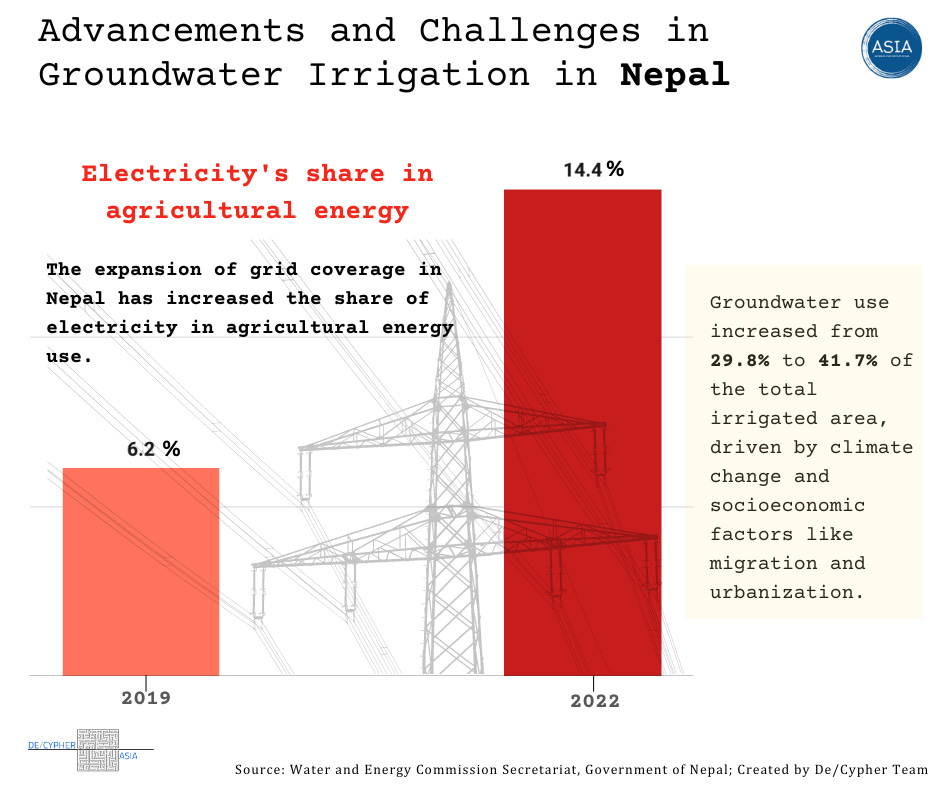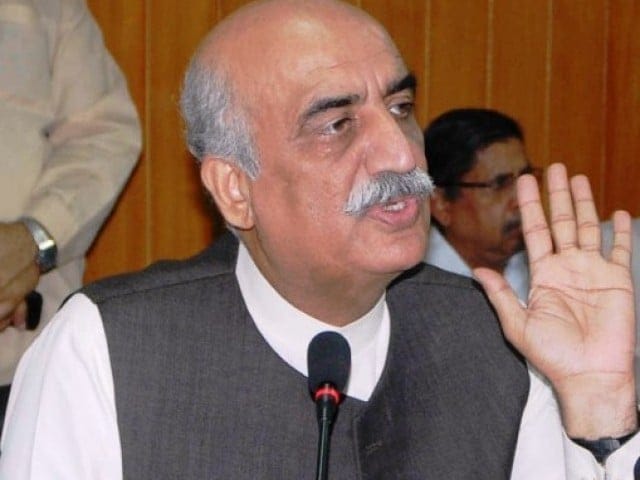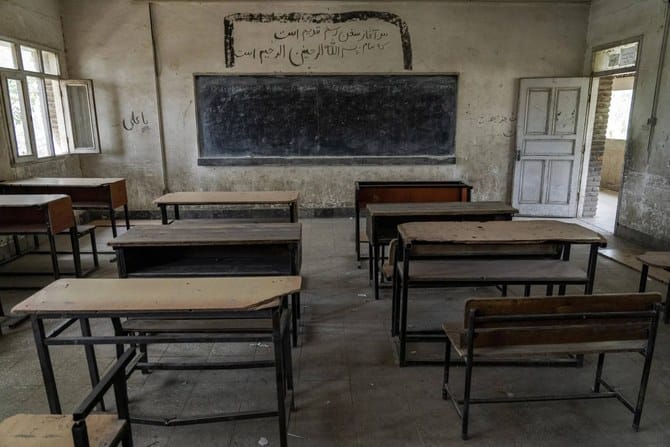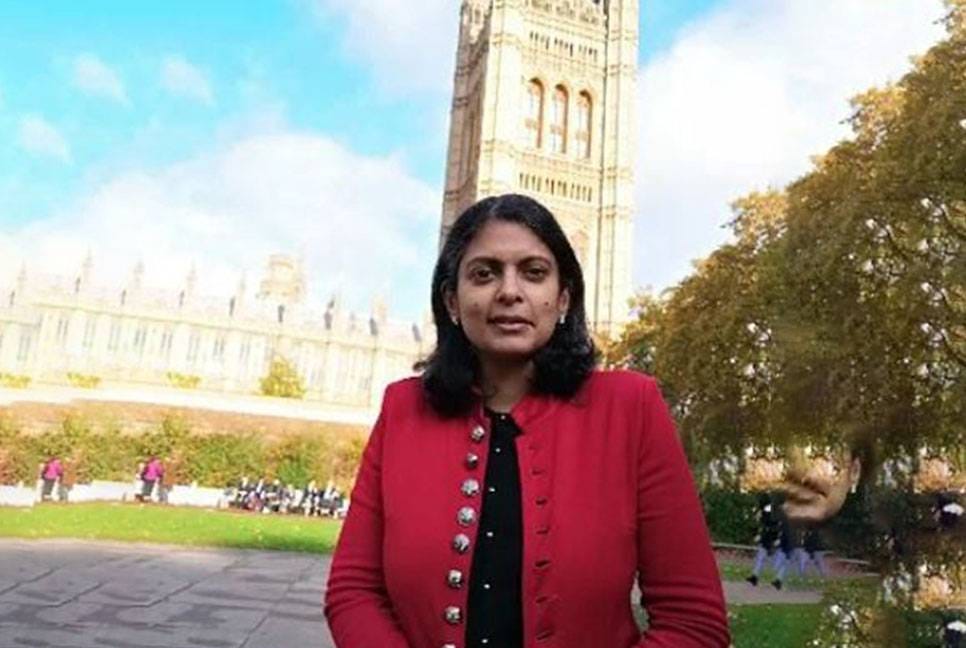Disappearing Languages in Pakistan, Internet Returns in Bangladesh, and International Trade Booms in Afghanistan
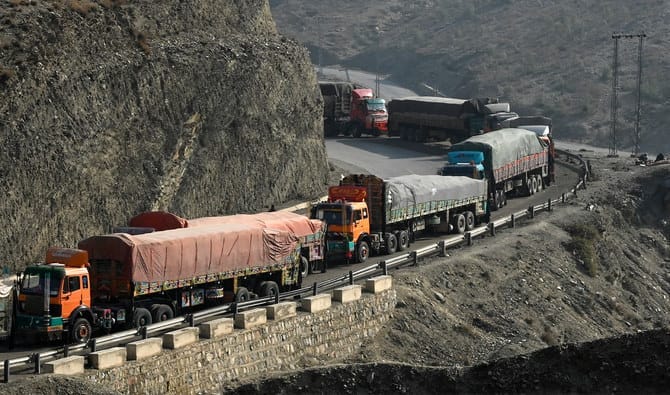
De/Cypher Data Dive 📈
In the first half of 2023, an unprecedented 800,000 Pakistanis left the country, including at least 100,000 highly skilled professionals such as doctors, nurses, engineers, IT experts, and accountants.
Asia View
Solar-Powered Pumps Revolutionize Agriculture in Nepal's Madhesh Province
Written By Neeti Goutam, Senior Research Communications Manager
In Nepal’s Madhesh province, a solar-powered pump has transformed the agricultural landscape for many smallholder farmers. Previously reliant on unpredictable rainfall for irrigation, these farmers faced inconsistent incomes, often struggling to cover the costs of seeds, fertilizers, and labor. The introduction of subsidized solar pumps, facilitated by the Alternative Energy Promotion Centre (AEPC), has provided a reliable and profitable alternative. This initiative has been part of a broader effort to enhance energy access in agriculture, with electricity's share in agricultural energy use rising significantly in recent years (6.15% in 2019 to 14.37% in 2022).
Historically, the Terai (Madhesh) region faced irrigation issues due to poor canal maintenance and mismanagement of groundwater resources. Efforts to improve irrigation with subsidized tube wells in the 1990s were hindered by irregularities and corruption. Since the mid-2010s, rural electrification and solar irrigation pumps have revitalized agriculture, encouraging farming and migration back to the area. However, access to groundwater remains unequal, with land ownership affecting irrigation access and exacerbating disparities. Climate change further strains groundwater availability (in 2021, groundwater use has increased to 41.7% of the total irrigated area), as recent low rainfall and dry conditions reveal the resource's vulnerability. Nepal’s new national irrigation policy aims to expand groundwater irrigation and ensure year-round access to water for agriculture. This policy underscores the need for sustainable management practices to prevent potential depletion of groundwater resources, drawing lessons from other countries like India and act early on the groundwater resources.
Af-Pak De/Cypher
29 July, 2024
Top Stories
Economy
$27bn re-profiling needed to secure IMF bailout
Khaleeq Kiani reports for Dawn that Pakistan has sought the re-profiling of more than $27 billion in debt and liabilities with friendly nations — China, Saudi Arabia and the UAE — to secure a 37-month IMF bailout package and ease energy sector foreign exchange outflows and consumer tariffs. Finance Minister Muhammad Aurangzeb on Sunday said Islamabad had already asked the friendly bilateral trio of lenders to roll over its more than $12bn annual debt portfolio by three to five years to secure the IMF board’s approval for a $7bn economic bailout by next month.
Pakistan initiated talks on reprofiling Chinese power sector debt in Pakistan
Ariba Shahid reports for Reuters that Pakistan has initiated talks on reprofiling its power sector debt to China, alongside talks on structural reforms suggested by the International Monetary Fund, Pakistan's finance minister told a press conference on Sunday. He said that Pakistan will address the reprofiling of Chinese credit to the power sector on a project-by-project basis and that Islamabad is looking to appoint a local advisor in China for the purpose.
Internal Politics
Key Pakistani Islamist party begins sit-in to protest increase in electricity bills
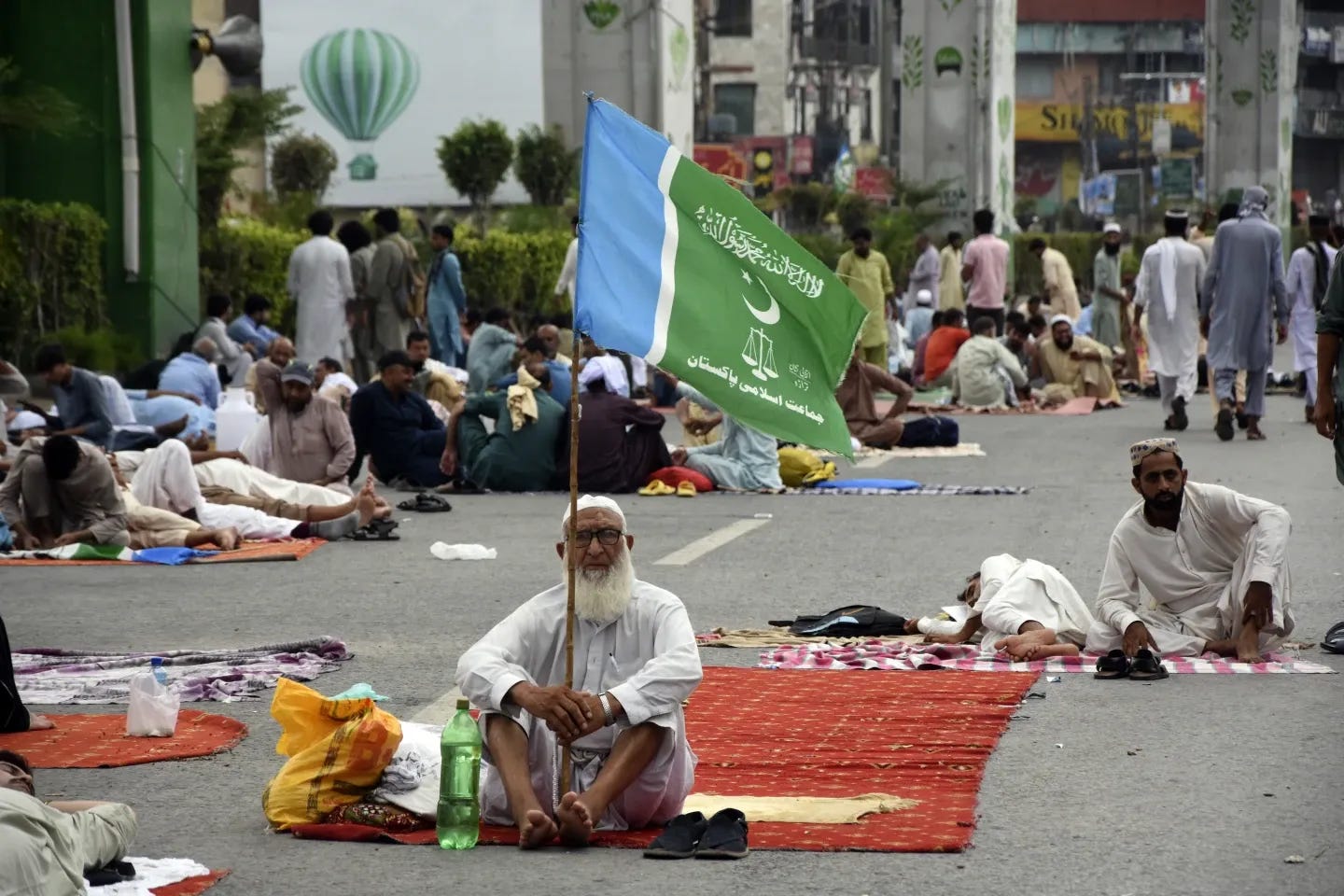
Ground News reports that hundreds of supporters of a key Islamist party began a sit-in protest in the garrison city of Rawalpindi late Friday after authorities detained dozens to prevent them from holding the rally in Pakistan’s neighboring capital, citing security reasons, officials said.
PM Shehbaz launches nationwide campaign to eradicate Hepatitis C
The Express Tribune reports that on World Hepatitis Day, Prime Minister Shehbaz Sharif urged for collective efforts to raise awareness and combat hepatitis, announcing a nationwide campaign to eradicate the disease. The Prime Minister the importance of the Day, dedicated to raising global awareness about hepatitis and its significant impact on individuals and communities. The prime minister underscored the necessary actions to eliminate the disease and ensure a healthier future for all.
PPP signals talks with PTI if Imran Khan agrees
The Express Tribune reports that Senior Pakistan People’s Party (PPP) leader Khurshid Shah has stated that his party is prepared to facilitate dialogue if Imran Khan, the founder of Pakistan Tehreek-e-Insaf (PTI), is willing to engage. The PPP's willingness to engage comes amidst a period of heightened political instability, following the PTI's hardline stance against the incumbent Pakistan Muslim League-Nawaz (PML-N) led government. Speaking to the media in Quetta, Shah welcomed the possibility of talks as a positive development.
Govt forms technical committee to resolve issues after ‘positive’ first meet with Jamaat-i-Islami (JI)
Irfan Sadozai reports for Dawn that Jamaat-i-Islami (JI) leader Liaquat Baloch on Sunday said that the government will form a technical committee to resolve the power and tax hikes issues and complete their “internal workings” by tomorrow while the party’s ongoing sit-in at Rawalpindi’s Liaquat Bagh will continue. JI Emir Hafiz Naeemur Rehman on Saturday warned of expanding the party’s Rawalpindi sit-in to other areas across the country if the government failed to meet its demands regarding skyrocketing electricity bills and rising taxes.
Pakistan and the world
China to support Pakistan in securing IMF deal approval: Aurangzeb
The Express Tribune reports Finance Minister Muhammad Aurangzeb announced that China will support Pakistan in securing approval for the International Monetary Fund (IMF) agreement. The statement was made during a press conference in Islamabad, highlighting ongoing efforts to improve the country's economic situation. FM Aurangzeb emphasised the need to provide facilities to the public if taxes are to be increased, pointing out that both the United States and China are vital partners for Pakistan. Discussions on local tax matters are currently underway. He stated that efforts are being made to ease the tax burden on the lower-income population while simplifying the taxation process for traders.
Afghanistan Update
In Afghanistan, Taliban ban on girls’ education leaves thousands of classrooms empty
Modaser Islami reports for Arab News that around 1.1 million girls were denied access to formal education since Taliban ban in 2021. Afghanistan had about 4,000 secondary and high schools for girls that have not returned to the classroom. Afghanistan officially recognized about 20,000 schools as of August 2022, of which only about half had functional buildings and about 5,000 were damaged after the war, data from the education ministry showed. Meanwhile, according to official estimates, there were about 4,000 secondary and high schools for girls in the country before the education ban was put in place.
Afghanistan's Intl Trade Reaches $5.2 Billion in First Half of 2024
Tolo News reported that the Ministry of Industry and Commerce stated that from January to June of this year, Afghanistan conducted trade worth $5.237 billion with various countries. According to Akhundzada Abdul Salam Jawad, the spokesperson for the ministry, Afghanistan exported nearly $700 million, with $58 million worth of exports going to Central Asian countries alone. Jawad added that efforts are ongoing to increase the export volume further this year.
Don’t expect too much from the Afghanistan War Commission
Eliot Wilson’s opinion contribution in The Hill discusses the Afghanistan War Commission’s first public hearing called to examine, in detail, with the calming distance of time, exactly what happened and to develop a series of lessons learned and recommendations for the way forward that will inform future decisions by Congress and policymakers throughout the United States Government.
Climate Migration and Disappearing Languages
Written By Priyanka Garodia, with insights from Dialogue Earth
The predominant discourse on climate change focuses on the physical, economic and biological, financial costs of climate change while largely ignoring the ‘cultural loss’ that vulnerable communities face due to the climate crisis. Isolated communities located in regions heavily vulnerable to climate change are at a double loss – the loss of their physical communities as well a slow depletion of their cultural ethos. Internally displaced people who migrate within their country undergo a spatial change along with disruptions in their linguistic ecology and their cultural practices. The cultural dimension to migration and the ‘double burden of loss’ that these communities carry is often not accounted for by national or international governments alike.
Northern Pakistan is one of the most diverse regions with over 30 endangered languages spoken there in small communities of people usually in the low thousands. The Northern regions of Pakistan including Gilgit-Baltistan and Khyber Pakhtunkhwa have been facing severe floods and other disasters related to climate change. A major consequence of this has been the mass migration of these small mountainous communities to low lying regions to ensure the safety of the people. The state in turn concentrates on urban infrastructure to provide better facilities to these people. However, the distinct cultural and linguistic identity of these communities is disappearing in turn. Some cases include,
Wakhi, a language spoken by some odd 40,000 people in Gilgit city is slowly disappearing since most communities from the city have found refuge in Karachi. Wakhi is being steadily replaced by Urdu is majority households. A similar plight faces Shina and Torwali, languages of small mountainous communities in Northern Pakistan.
Dameli is spoken by roughly 5,000 people residing in the Chitral district devastated by the floods in 2010. 40% of the people have migrated to other places leading to the gradual loss of the language.
An ancient Iranian language of Yidgha faces a similar situation. Spoken by 6,000 people, the language is disappearing slowly over time as the people speaking it are forced to migrate from their homes to less dangerous territories.
Economic Brief 2024
by KPMG Taseer Hadi & Co
The Economic Brief 2024 by KPMG Taseer Hadi & Co. provides a comprehensive overview of Pakistan's economic performance during the fiscal year 2024 (FY24). The report highlights key macroeconomic indicators, recovery trends, and challenges faced by the economy.
Economic Overview
GDP Growth: Pakistan's GDP grew by 2.4% in FY24, rebounding from a contraction of -0.2% in FY23. This recovery was primarily driven by a 6.25% increase in agricultural output, particularly in cotton, rice, and wheat production. The industrial sector saw modest growth of 1.21%, while the services sector also expanded by 1.21%.
Inflation and Monetary Policy: Inflation averaged 26% during the first eleven months of FY24, down from 29% in the previous year. The State Bank of Pakistan maintained a policy rate of 22% throughout most of the year, later reducing it by 150 basis points to 20.5% in June 2024 as inflationary pressures eased. The Consumer Price Index (CPI) showed signs of stabilization, dropping to 11.7% year-on-year by May 2024.
External Sector Performance: The current account deficit significantly improved from $3.9 billion to $0.2 billion during the first ten months of FY24. This was aided by a reduction in imports, which decreased by 5%, and an 11% increase in exports. Foreign exchange reserves rose to $14.2 billion in May 2024, compared to $9.2 billion a year earlier.
Fiscal Performance
Budget Deficit: The fiscal deficit stood at PKR 3.8 trillion, approximately 3.7% of GDP, reflecting an increase from the previous year. The government improved revenue collection through enhanced tax measures, achieving a total tax collection of PKR 9.8 trillion in the first nine months of FY24.
Debt Profile: Pakistan's total public debt increased from PKR 59.2 trillion in March 2023 to PKR 67.5 trillion in March 2024. This rise is attributed to high debt servicing costs, which consume a significant portion of government revenues.
Sectoral Analysis
Agricultural Sector: The agricultural sector's robust growth was driven by significant increases in crop production, particularly in wheat (11.6% increase) and cotton (108.2% increase), which rebounded after previous flood damage. This sector's performance was crucial in offsetting slower growth in industrial and service sectors.
Industrial and Services Sectors: The industrial sector's growth was hindered by high interest rates and reduced aggregate demand, although several sub-sectors, including food and pharmaceuticals, showed positive growth. The services sector remained resilient, supported by government investments in transportation and communication infrastructure.
Future Outlook: Looking ahead to FY25, challenges remain, including high debt servicing costs and the need for a new IMF program to address financing needs. The government is actively negotiating a new three-year program, anticipated to be between $7-8 billion, to stabilize economic indicators and manage external repayments. In summary, while Pakistan's economy demonstrated recovery signs in FY24, marked by GDP growth and improved external balances, it continues to face significant challenges that require careful management and strategic policy interventions.
Read the full report here.
Bangladesh De/Cypher
29 July, 2024
Quota Reform Protests: The Aftermath
Circular Issued: 93pc Jobs on Merit, 7pc from Quotas
The Bangladeshi government has issued a circular mandating that 93% of civil service recruitments will be based on merit, with 7% reserved for various quotas. The new system, effective immediately, aligns with a Supreme Court order. Quotas include 5% for children of freedom fighters, 1% for ethnic minorities, and 1% for persons with disabilities and the third gender. Law Minister Anisul Huq confirmed the implementation, following violent student protests that resulted in at least 150 deaths and significant property damage. (Banglanews24.com)
British MP Rupa Huq Raises Question on Bangladesh Situation
British MP Rupa Huq raised concerns in the UK parliament about the situation in Bangladesh related to the students' quota reform movement. She highlighted recent protests in major cities including Rome, Paris, Manchester, and London, mentioning the deaths of numerous students and the internet shutdown in Bangladesh. MP Lucy Powell, responding on behalf of the UK government, acknowledged the gravity of the issue, expressing deep concern over the violence and loss of life. (Daily Sun)
Hasina Vows Justice for Quota Protest Violence Victims
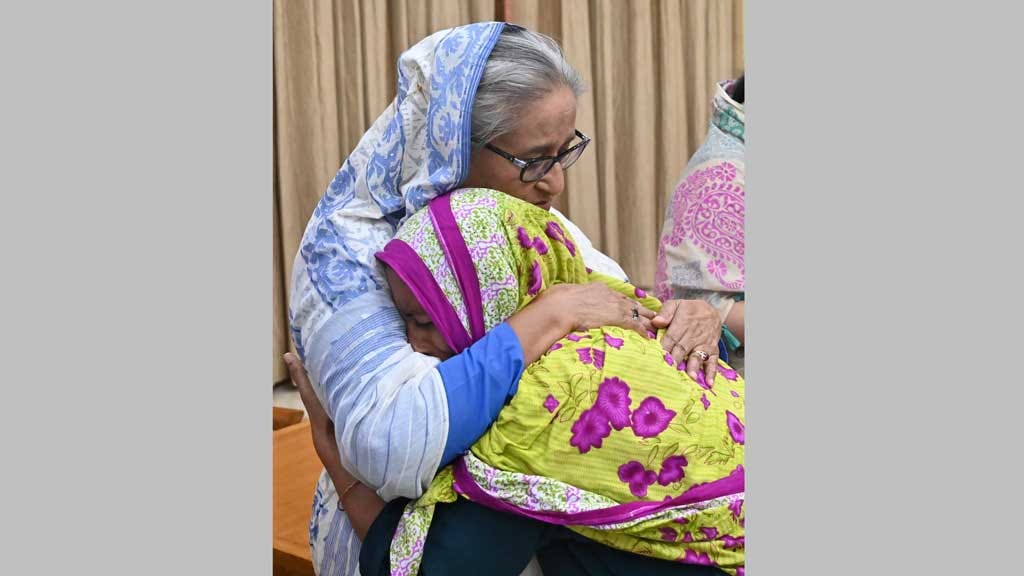
Prime Minister Sheikh Hasina promised justice for those killed during the recent quota reform protests. Meeting with families of the 34 victims at Ganobhaban, she vowed to identify and punish those responsible. Hasina provided financial aid to the bereaved families and urged their cooperation in bringing perpetrators to justice. She condemned the violence that resulted in significant loss of life and destruction of property, including the burning of COVID hospitals. Hasina reassured the families of her continuous support, reflecting on her personal losses and her commitment to public safety. (Bdnews24.com)
Mobile Internet Back Without Social Media
Mobile internet has resumed for 14 crore users in Bangladesh after a ten-day blackout, but social media platforms like Facebook, TikTok, WhatsApp, and YouTube remain unavailable. As compensation, subscribers receive a 5GB data pack for three days. State Minister for ICT and Telecom Zunaid Ahmed Palak stated that letters were sent to social media companies, requesting responses by July 31 regarding fake news and propaganda. (The Daily Star)
Nationwide Crackdown, Arrests Continue
552 more people were arrested in the last 36 hours, bringing the total to 8,914 over 11 days in Bangladesh's nationwide crackdown against protesters and opposition parties. Most arrests involve BNP and Jamaat leaders, with 2,764 people arrested in Dhaka alone. Authorities have filed 594 cases across 46 districts. Eight prominent figures, including former Ducsu VP Nurul Haque Nur and BNP's Ruhul Kabir Rizvi Ahmed, were remanded for five days over vandalism charges. The crackdown follows violent protests, with the government aiming to restore order and address public safety concerns. (The Daily Star)
Police Undergo Major Reshuffle
The Bangladesh Police have implemented a significant reshuffle, transferring two additional inspector generals of police (AIGPs), five additional deputy inspector generals (ADIGs), and 48 Superintendents of Police (SP). The Public Security Division of the Home Ministry issued four gazette notifications on Sunday, detailing these changes. The AIGPs transferred are AKM Shahidur Rahman and Krishna Pada Roy. The reshuffle involves 32 SP-ranked officials in one order and 16 in another, with all transfers effective immediately. (TBP Online)
DB Says Uncovered Mastermind Behind Metro Station Attacks
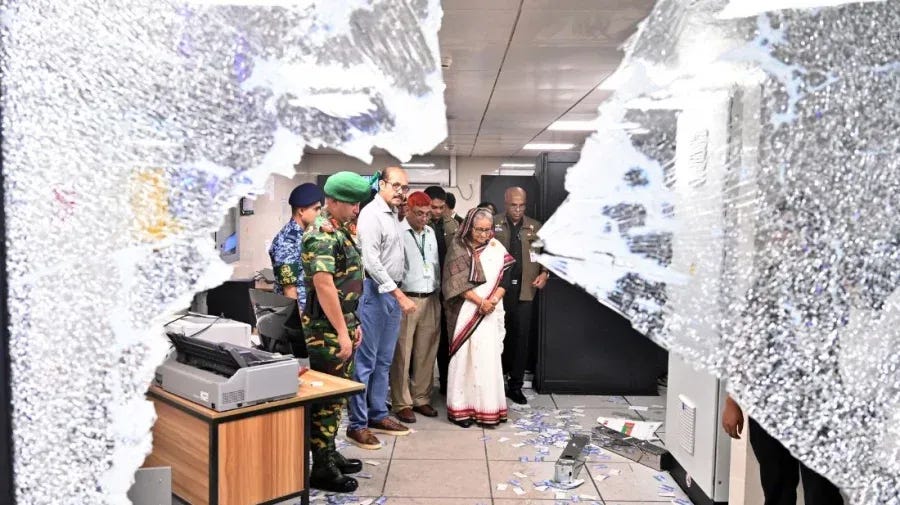
The Dhaka Metropolitan Police's Detective Branch (DB) identified Abu Hannan Talukdar, Chhatra Dal Joint Secretary, as the mastermind behind the recent metro rail station attacks. Coordinated by Chhatra Dal leaders and led by Imam Al Naser Mishuk, the attacks involved 1,000-1,500 participants. Four individuals, including Chhatra Dal leaders, were arrested by the Cyber Crime Department of the DB. DB chief Harunor Rashid stated that Jamaat-BNP activists exploited the student movement to launch these assaults. The investigation continues to apprehend other suspects involved in the vandalism and arson at Mirpur 10 and Kazipara stations. (The Dhaka Tribune)
PM Seeks Japan's Cooperation to Reopen Damaged Metrorail Stations
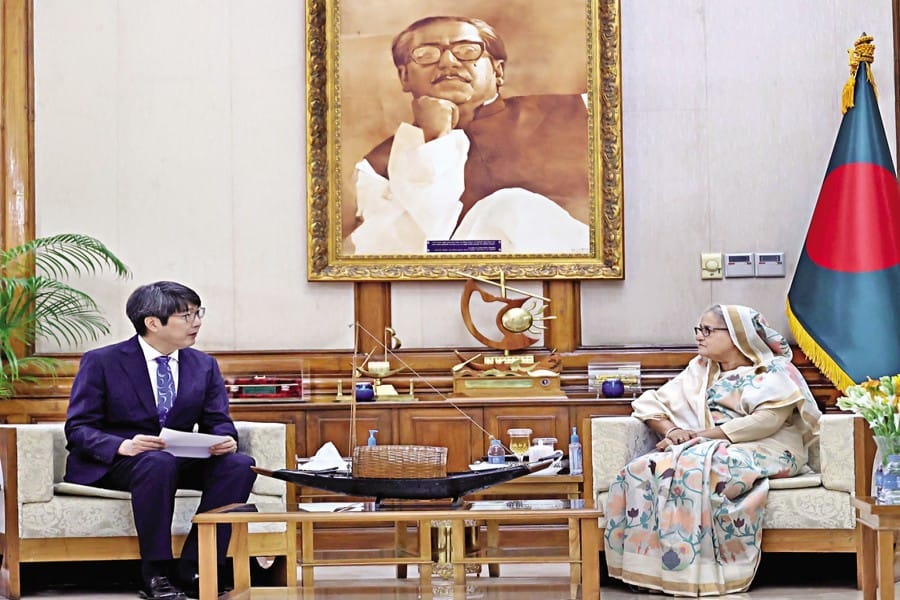
Prime Minister Sheikh Hasina requested Japan's assistance in reopening the vandalized metrorail stations at Mirpur-10 and Kazipara during a meeting with Japanese Ambassador Iwama Kiminori at Ganabhaban. The Japanese envoy expressed sympathy for the casualties caused by recent violence related to the quota reform movement. The ambassador stated that Japan would assess the damage before determining their support. (The Financial Express)
Propaganda is Being Run Against Army: ISPR
The Inter-Services Public Relations (ISPR) has stated that a smear campaign is being conducted against the Bangladesh Army in foreign media and on social media. The ISPR's press release highlighted that "vested quarters" are spreading false and misleading information. The agency urged citizens not to be misled by these reports and reassured that the army remains committed to supporting the people and national interests. (Prothom Alo)
HRW Condemns as 57 Bangladeshis Jailed for Anti-Govt Protest in UAE
Human Rights Watch (HRW) condemned the United Arab Emirates (UAE) for the trial and sentencing of 57 Bangladeshis who received lengthy prison terms for protesting against their government. An Abu Dhabi court sentenced three to life imprisonment and the others to 10-11 years after a swift investigation and trial. HRW criticized the "abusively fast judicial proceedings," raising concerns about fairness and due process. Videos verified by HRW showed large demonstrations across several emirates. (Prothom Alo)
Bangladesh Faces $10b Setback, Image Crisis: Biz Leaders
The recent shutdown has caused significant economic losses and damaged Bangladesh's reputation. Business leaders estimate the financial impact to be around $10 billion. The Bangladesh Garment Manufacturers and Exporters Association reported losses of Tk6,400 crore. The Foreign Investors Chamber of Commerce and Industries stressed the long-term image damage, comparing it to setbacks from past disasters. Business leaders urged the government to improve the ease of doing business, reduce port charges, ensure energy supply, and restore investor confidence. The government plans to address key issues in separate meetings with relevant stakeholders. (The Business Standard)
Ensuring smooth FDI inflow will be a challenge
Opinion Piece from The Daily Star
Violence centring around the quota reform movement, a five-day total internet blackout, and the ongoing curfew have naturally shaken foreign investor's confidence in Bangladesh, which must be addressed. According to a report in this daily, the country needs to attract foreign direct investment (FDI) equal to 1.66 percent of its GDP annually to become an advanced economy by 2041. But in 2022, Bangladesh's FDI inflow amounted to only 0.75 percent of its GDP. Bangladesh Bank data shows that in 2023, net FDI inflow fell to $3 billion, a decrease of 14 percent from $3.5 billion in 2022. Against this backdrop, the confidence crisis caused by recent events becomes more concerning.
What’s discouraging our foreign investors?
When it comes to attracting investors, a country's reputation as a reliable investment destination is vital. Investors already had a number of issues with Bangladesh in that regard. Problems like corruption, bureaucracy, anti-competitive procurement system, violation of intellectual property rights, and inconsistent policy shifts have all been previously identified as barriers to Bangladesh attracting higher FDI. With several international rights organisations and foreign countries having identified a number of human rights violations during the government's brutal crackdown on protesters recently, the country's image as an investment hub has surely taken a further hit. And this crisis cannot be quantified, as explained by the president of the Foreign Investors' Chamber of Commerce and Industry (FICCI).
Read the full article here.
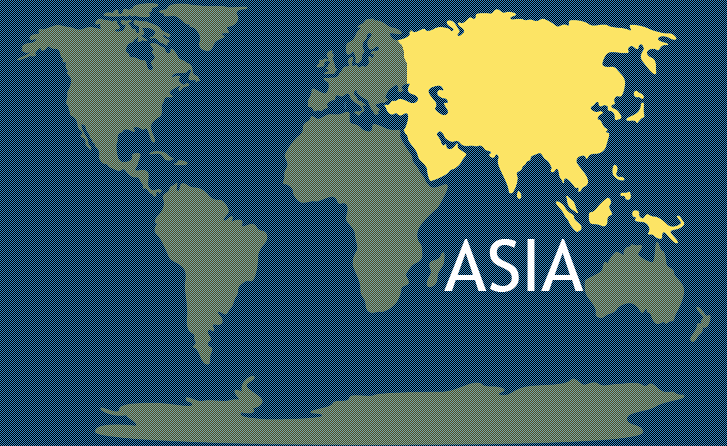
Rest of World
Quad Foreign Ministers Meet in Tokyo for Talks on Maritime Security, Cyber
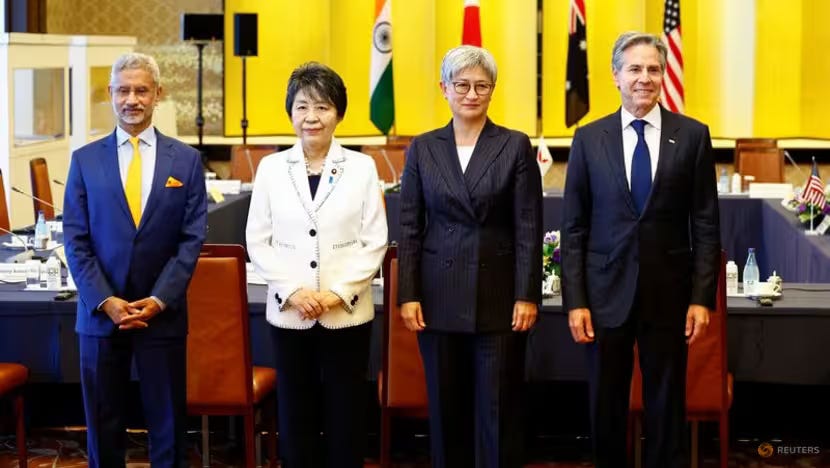
Foreign ministers from Australia, India, Japan, and the United States, collectively known as the "Quad," convened in Tokyo to discuss maritime security and cyber defense initiatives. Australia's Penny Wong emphasized regional peace and stability, while Japan's Yoko Kamikawa stressed the importance of cybersecurity and maritime security training. (CNA)
North Korea Vows 'Total Destruction' of Enemy on Korean War Anniversary
North Korea pledged to "totally destroy" its enemies if ordered by leader Kim Jong Un. Senior military officials expressed intense animosity towards the U.S. and South Korea during a meeting commemorating the 71st Korean War armistice anniversary. (Reuters)
Opposition claims victory after Maduro was declared the winner

Nicolás Maduro, 61, has been declared the winner in Venezuela’s presidential election by the electoral authority, setting up a high-stakes showdown that will determine whether the South American nation transitions away from one-party rule. (AP)
ASEAN urges Myanmar to start peace process, alarmed over Gaza casualties
Foreign ministers of the Southeast Asian regional bloc ASEAN on Saturday condemned violence against civilians in military-ruled Myanmar and urged all parties to end hostilities and follow an agreed peace plan. (Arab News)
---


